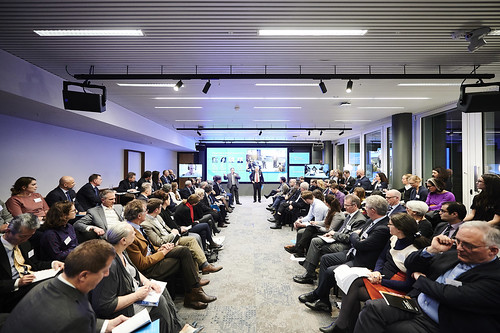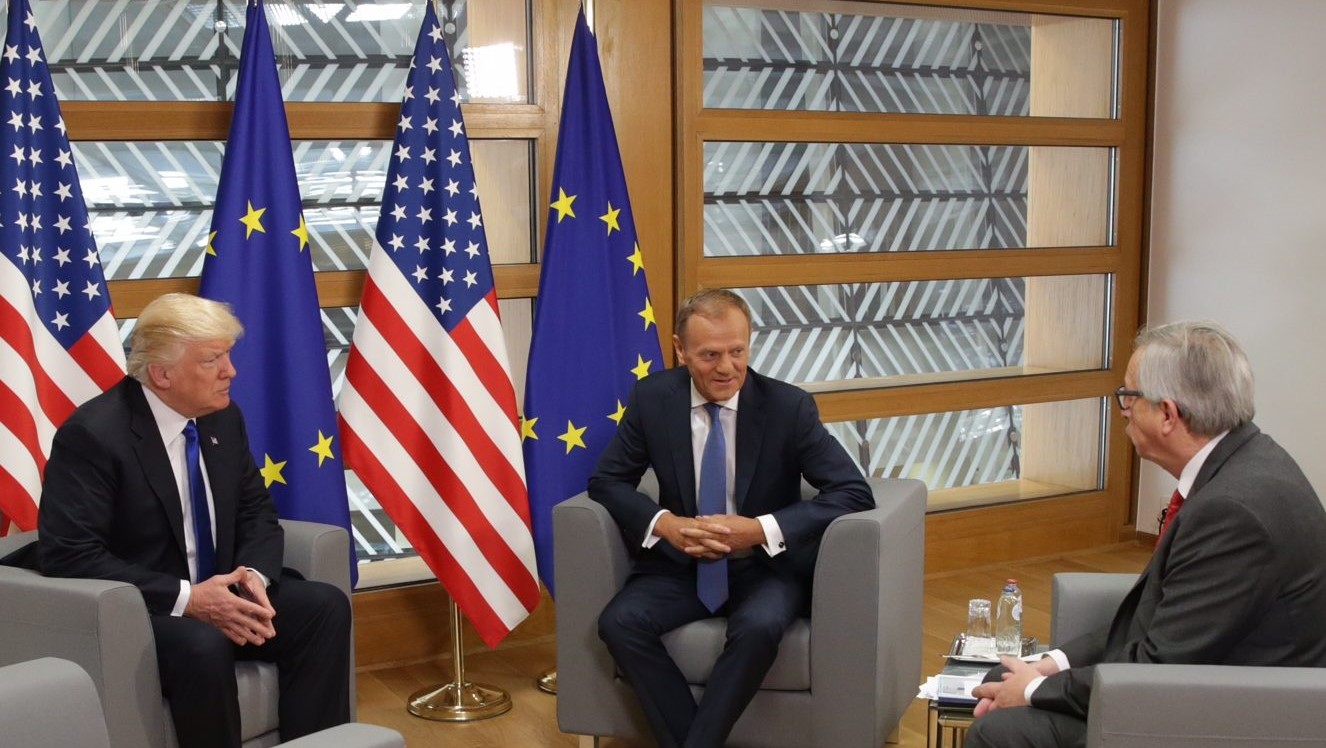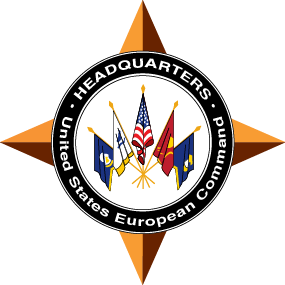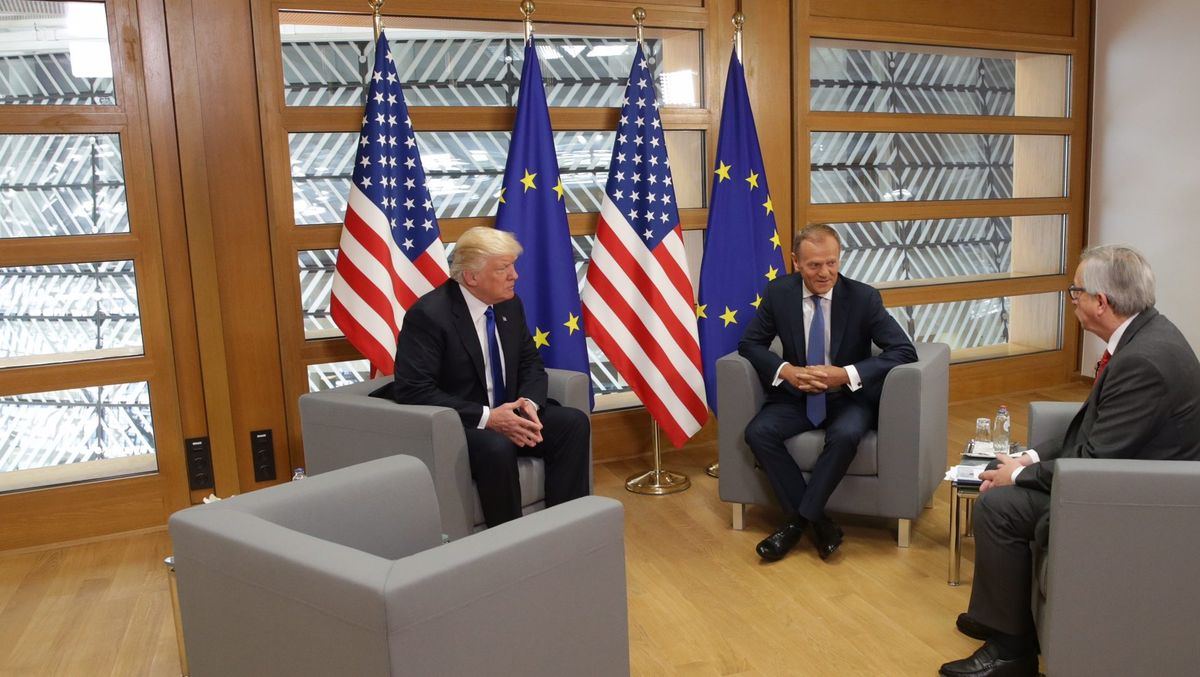
Summary
Transatlantic defence: are we watching the same movie?
An element of strategic divergence means the US and Europe are currently “not quite watching the same movie on the two sides of the Atlantic”, but there is hope that transatlantic defence industrial cooperation can function better if trade-offs are accepted and we have a shared view of the value of working together as allies, says the author of Friends of Europe’s latest report on peace, security and defence.
A minefield of opportunity: transatlantic defence in the Trump era, written by Politico journalist and Friends of Europe Senior Fellow Paul Taylor, was launched in Brussels on 28 January.
The report examines the political and strategic context – both historical and current – that helps shape the relationship between NATO allies in Europe and North America. It takes a detailed look at the American and European defence sector markets, the challenges and obstacles that remain within their structures and regulations, and how more efficient and open defence industrial cooperation could effectively plug NATO-identified capability gaps, strengthen joint efforts to tackle the changing nature of security threats, improve interoperability and give the taxpayer better value for money.
Taylor’s conclusions, discussed by a panel of experts at the launch, offer a ‘to do’ list on how to optimise cooperation to strengthen NATO while making the most of Europeans’ increased willingness to invest in their own defence. Among the recommendations is the establishment of a US-EU challenge fund for companies to collaborate on defence-related technologies in areas such as artificial intelligence and cyber security.
Ben Hodges, former commander of US army forces in Europe and currently Pershing Chair in Strategic Studies at the Center for European Policy Analysis (CEPA) in Washington DC, agreed with the report’s suggestion to have the US encourage more European defence investment and development.
“At the same time the US of course wants to compete in Europe in the defence industry. They don’t have to be exclusive of each other – we should compete and provide the best possible product. As a former soldier, what I care about the most is that our men and women have the best possible equipment and capabilities to be effective,” he said.
Managing Director for the Americas at the European External Action Service (EEAS), Edita Hrdá, said the new European Commission was putting a high priority on transatlantic relations and security and defence. This is keeping in line with its aim of becoming a ‘true geopolitical actor’.
“What we are choosing is multilateralism, a more geopolitical Commission, and we clearly say that NATO will be the cornerstone of EU defence policy. This is clear and we need to repeat it in the moments when someone has doubts,” she said.
Echoing his US colleagues on the panel, Jim Townsend, Adjunct Senior Fellow at the Center for a New American Security (CNAS) Transatlantic Security Program, said it was important that the report had set out the historical context to the EU-US relationship, so people understand that “we’re not dealing with something that’s a Trump thing”.
“These issues with transatlantic defence trade have been around for decades. You can’t understand where we are today, and the advances we have made, unless you understand the context,” he said.
Moderator and Friends of Europe Senior Fellow Jamie Shea said it was clear from the debate that despite recent disquiet, goodwill and intent to improve cooperation remained between the transatlantic partners. “There is a real sense that our destiny is still with each other. We don’t hear that as often as we need to,” he said.
Defence is still seen as an issue of national sovereignty, he added: “But in the 21st century we need to learn to trust each other, to work with each other, and to pool that sovereignty – on both sides of the Atlantic, and not just within Europe – if we are really going to stay ahead of the game.”
About
For 70 years, NATO allies in Europe and North America have stood together to defend their territorial integrity and uphold a broad set of shared interests and values against common security threats. Yet, despite pledging in the North Atlantic Treaty to “seek to eliminate conflict in their international economic policies and … encourage economic collaboration between any or all of them”, allies have largely gone their separate ways in their national defence industries. The need to be able to conduct operations together – whether through NATO, on UN missions or in ad hoc coalitions – as well as the search for economies of scale, will continue to provide a strong incentive for cooperation beyond current political frustrations.
With this in mind, Friends of Europe is releasing a study on transatlantic defence cooperation. Authored by Paul Taylor, Senior Fellow at Friends of Europe and POLITICO columnist, and based on more than 40 interviews conducted in Europe and North America, the forthcoming report examines the strategic context, obstacles to and opportunities for transatlantic defence cooperation on both sides of the Atlantic.
The report will seek to draw conclusions and offer recommendations on how to optimize transatlantic defence industrial cooperation to strengthen NATO while making the most of Europeans’ increased willingness to invest in their own defence, without becoming simply a subsidiary or sub-contractor of the U.S. defence industry.
The study complements five similar studies on France, Germany, the United Kingdom, Poland and Italy’s roles in European security and defence.
Related content:
Our events include photos, audio and video recording that we might use for promotional purposes. By registering, you give your permission to use your image. Should you have any questions, please contact us.
PHOTO CREDIT: Flickr/European Council President
Schedule
Report presentation by:
Paul Taylor
Senior Fellow for Peace, Security and Defence at Friends of Europe
With reactions and comments from:
Ben Hodges
Lieutenant General (Retired), Former commanding general of United States Army Europe and NATO Senior Mentor for Logistics
Edita Hrdá
Ambassador and Permanent Representative at the Permanent Representation of the Czech Republic to the EU
Jamie Shea
Senior Fellow for Peace, Security and Defence at Friends of Europe, and former Deputy Assistant Secretary General for Emerging Security Challenges at the North Atlantic Treaty Organization (NATO)
Jim Townsend
Adjunct Senior Fellow in the Center for a New American Security (CNAS) Transatlantic Security Program
Speakers
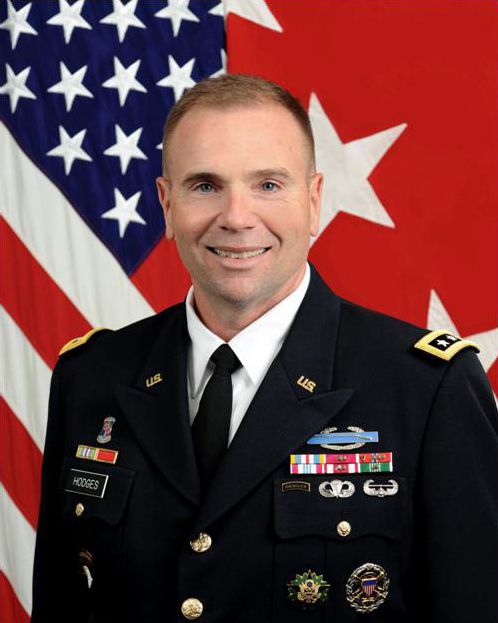
Lieutenant General (Retired), Former commanding general of United States Army Europe and NATO Senior Mentor for Logistics
Prior to his current position of Senior Mentor for Logistics at NATO, Lieutenant General (Retired) Ben Hodges of Senior Mentor notably served as commanding general of US Army Europe. He also formerly held the position of senior advisor to Human Rights First. Previously, Hodges held the Pershing chair in Strategic Studies at the Center for European Policy Analysis (CEPA). Throughout his career, his operational assignments included service in Iraq and serving as the director of operations at Regional Command South in Kandahar, Afghanistan.
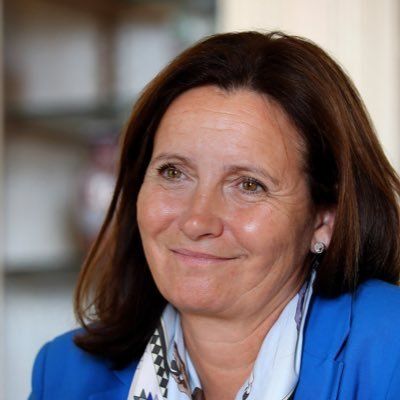
Ambassador and Permanent Representative at the Permanent Representation of the Czech Republic to the EU
Edita Hrdá has a long and distinguished career in diplomacy, with over 25 years of experience in the field. In her current capacity, she manages the relations of the European Union with North and South American countries. Prior to her role in the EEAS, she served as the permanent representative of the Czech Republic to the United Nations. She also worked in Latin America as the ambassador to Argentina and Paraguay, and has held high-level positions in the Czech Ministry for Foreign Affairs, including as director of the American department and the director of multilateral economic affairs.
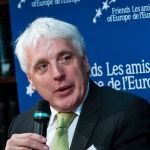
Senior Fellow for Peace, Security and Defence at Friends of Europe, and former Deputy Assistant Secretary General for Emerging Security Challenges at the North Atlantic Treaty Organization (NATO)
Retiring from NATO in September 2018 after 38 years at the organisation, Jamie Shea has occupied a number of senior positions at NATO across a wide range of areas, including external relations, press and media, and policy planning. As NATO’s spokesperson, he was the face of the alliance during the Bosnia and Kosovo conflicts. He later worked as the director of policy planning in the private office of former secretary general Rasmussen during the preparation of NATO’s 2010 Strategic Concept. Shea is also a regular lecturer and conference speaker on NATO and European security affairs.
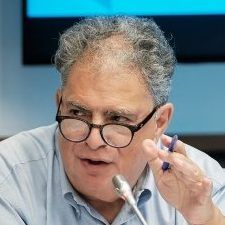
Senior Fellow for Peace, Security and Defence at Friends of Europe
Paul Taylor is a Senior Fellow at Friends of Europe and the author of the think tank’s European Defence Cooperation report series. He previously spent four decades working for Reuters as a foreign correspondent in Paris, Tehran, Bonn and Brussels, as bureau chief in Israel/Palestine, Berlin and Brussels, as chief correspondent in France, as diplomatic editor in London, and finally as European affairs editor. Taylor’s assignments have included covering the Iranian revolution, the Cold War Euromissile crisis, the 1991 Gulf War, German reunification, the Maastricht summit, France in the 1990s, EU enlargement, the Eurozone crisis and the fall of the Muslim Brotherhood government in Egypt.
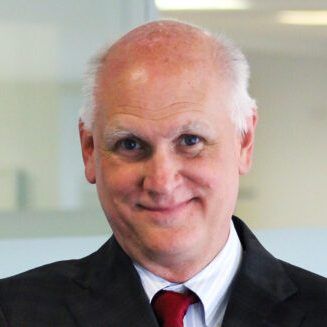
Adjunct Senior Fellow in the Center for a New American Security (CNAS) Transatlantic Security Program
After serving as US Deputy Assistant Secretary of Defense (DASD) for European and NATO Policy, Townsend completed more than two decades of work on transatlantic security in the Pentagon, at NATO and at the Atlantic Council. In these roles, he helped execute US military engagement in almost every conflict from the Gulf War to the reintroduction of US forces into Europe. He was also at the heart of NATO enlargement and reform. Prior to this, Townsend worked on foreign military sales at the Defense Security Cooperation Agency (DSCA) as a Country Director for European security assistance and as the assistant to the DSCA Comptroller.
Partners
Co-organised with
Activities
Frontline voices: 25 years of women, peace and security
Next event In person & livestreamed
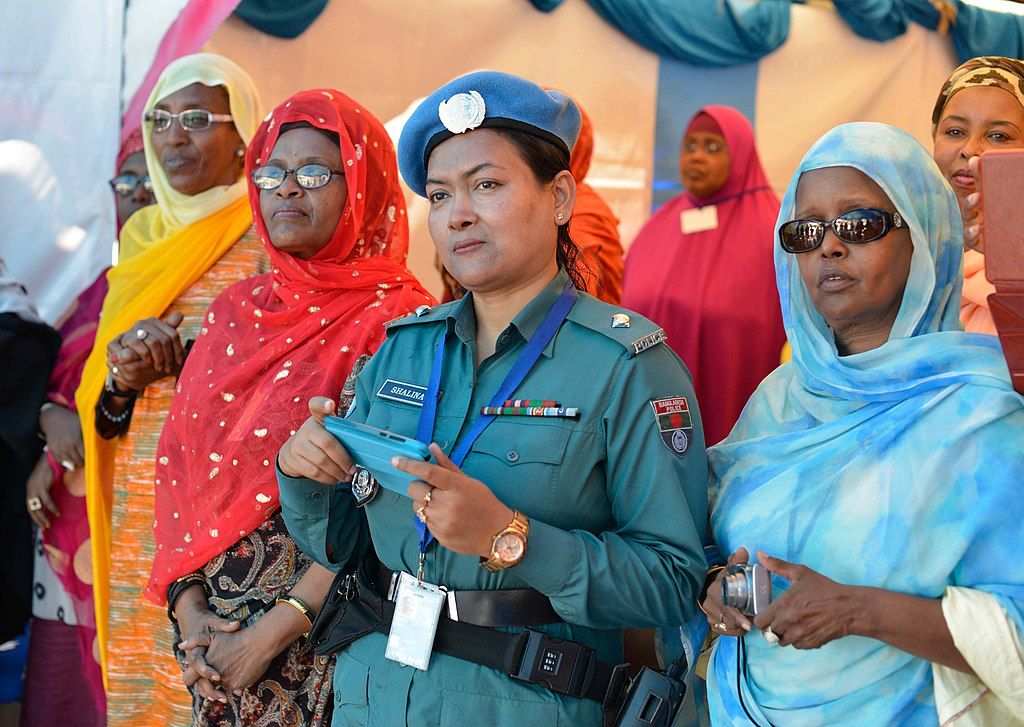
- Area of Expertise
- Peace, Security & Defence
From ambition to action: building Europe’s Defence Union
Past event In person

- Area of Expertise
- Peace, Security & Defence
EU-Western Balkans Summit 2025
Next event In person & Livestreamed

- Area of Expertise
- Peace, Security & Defence
Frontline Voices: renewing the women, peace and security agenda
Past event Online

- Area of Expertise
- Peace, Security & Defence
The EU must define its red lines in a tough new security doctrine
- Category
- Frankly Speaking
- Author
- By Giles Merritt
The Shanghai Cooperation Organisation meets in China: is the Axis of…
- Category
- #CriticalThinking
- Author
- By Jamie Shea
Policy Voices | Ukraine's war, reshaped by women. Ukraine's women, reshaped…
- Category
- Podcast
- Area of Expertise
- Peace, Security & Defence
Rethinking the WPS agenda: intersectionality in Europe’s changing defence…
- Category
- #CriticalThinking
- Author
- By Dimitra Koutouzi
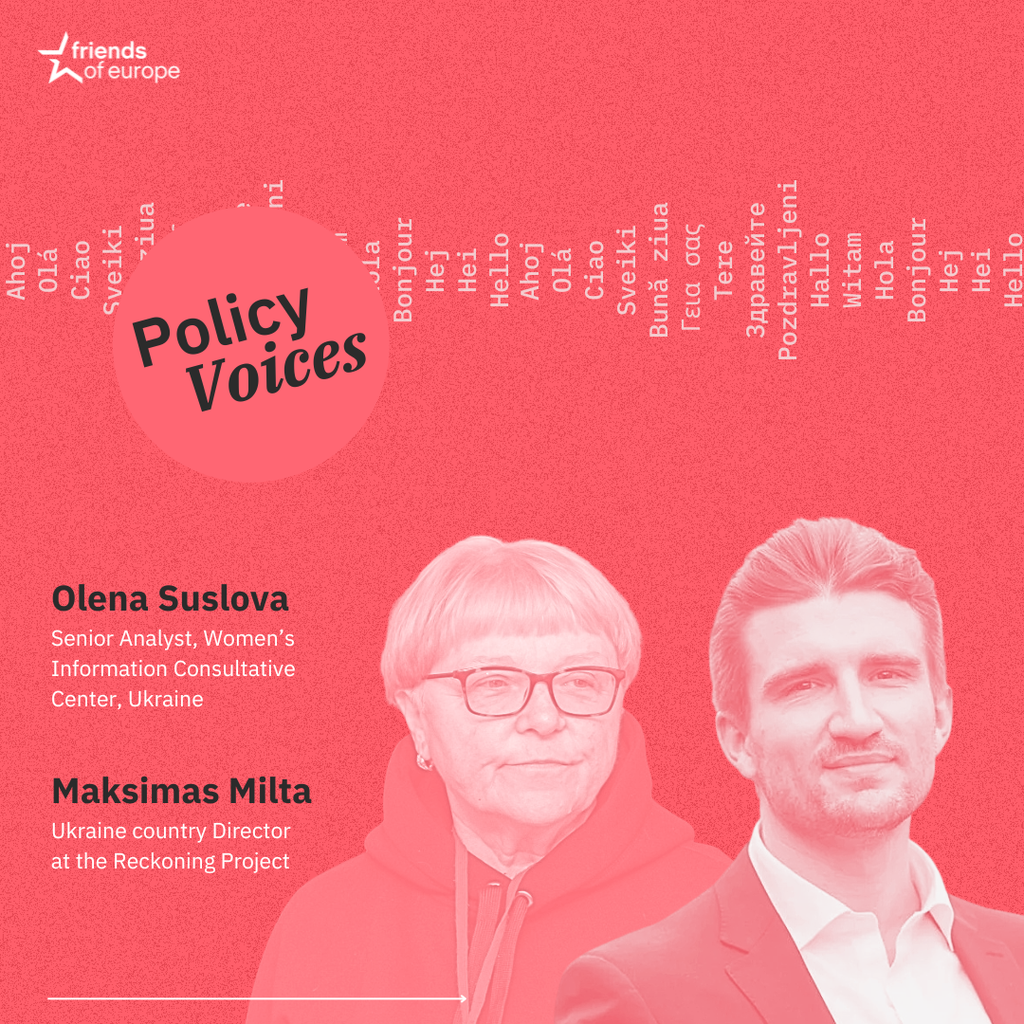
- Area of Expertise
- Peace, Security & Defence

- Area of Expertise
- Peace, Security & Defence

- Area of Expertise
- Peace, Security & Defence

- Area of Expertise
- Peace, Security & Defence
Continue
the debate on
- Debating Europe
